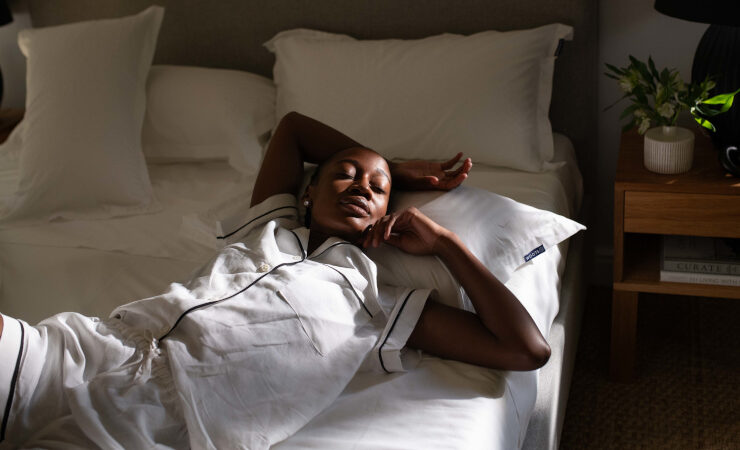Karen Pike Opens Up About the Impact of Menopause on Skin Health

Menopause doesn’t occur all of a sudden. There are subtle signs that indicate a woman is approaching menopause, and of all the signs that one usually experiences during this time, the changes that occur to a woman’s skin are the most evident.
As per the American Academy of Dermatology, women face a 5% drop in their collagen levels during the first five years of menopause, with the levels dropping about 2% each year for the next 20 years or so that follow.
When you enter the transitional phase of menopause, you might notice your skin appearing drier, along with the presence of wrinkles and sagging being more prominent.
It’s natural to feel disheartened at your skin not looking the way it did a decade ago, but there are things you can do to combat the effects of menopause on your skin.
Dr. Karen Pike and her team of doctors approached a group of women of menopausal age and asked them about the steps they took to manage the impact of menopause on the health of their skin.
Most of them were unaware of the right steps to take for this purpose, and when they were told that there were indeed things they could do on their part to bring the effects under control, they were left pleasantly surprised.
Today, we’re sitting with Dr. Karen Pike to discuss how menopause affects the skin health of those who go through it. She also talks about skin care tips during menopause.
Having been a medical professional for a long time now, her interactions with various women led her to realise that knowledge regarding menopause can often be scarce and misleading.
Hence, through her website, Simply Menopause, Dr. Pike aims to provide as much information as possible to help women going through this particular phase.
Here is Dr. Karen Pike’s valuable insight into how to look after your skin during menopause.
Interview with Dr. Karen Pike
Question: Is it common to develop dry and irritated or sensitive skin during menopause?
Dr. Pike: Thank you so much for having me! To answer your question, yes, it’s common for women to develop dry and irritated skin as they go through menopause.
Retaining moisture becomes difficult during menopause. This is what leads to dry skin, especially if you reside in a region that is hot and dry.
Additionally, the pH level of your skin changes at around the age of 50, after which the skin becomes irritated and more sensitive. If a woman has rosacea or eczema, it could worsen at this time.
Question: Is it true that age spots and acne make an appearance during menopause?
Dr. Pike: Oh yes, they do. During menopause, the signs of sun damage become more pronounced, causing the skin to become more pigmented. When the sun damage is particularly deep, it also leads to the presence of age spots or sunspots.
Menopause brings about hormonal changes that could amplify sebum production. As a result of this, your pores could get blocked, causing pimples and blackheads.
Question: Why does the skin get saggy during menopause?
Dr. Pike: With the decrease in collagen production, the skin loses its tightness and youthfulness. This is why women experience saggy and loose skin during and after menopause.
Question: That’s very helpful. We have heard that menopause can also cause the growth of facial hair. Is that true?
Dr. Pike: Yes, unwanted facial hair is a common menopausal symptom. As estrogen levels decline during menopause, it causes women to experience hair growth on their faces. While the hair on the scalp reduces, women begin to witness peach fuzz or coarse and dark hair on their chin and upper lip.
Question: Now that we have covered how menopause affects the skin, let’s get into what women can do to take care of their skin during this time. What do you believe is the first thing one should do in terms of skincare while going through menopause?
Dr. Pike: I believe that being kind to your skin is important throughout the course of one’s life. However, looking after your skin and paying attention to what it needs becomes even more imperative as you go through menopause.
The very first thing I think one should do is clean their face well. While cleaning your face is an important step in any skincare routine, it becomes even more important with age and when you approach menopause.
Since the skin is drier at this point, remember to choose a cleanser that is ideal for dry skin. Don’t go for a gel or foam cleanser. Instead, choose a creamy cleanser that won’t strip your skin of its moisture.
Question: With dry skin being such an issue, how can women deal with it while going through menopause?
Dr. Pike: Post menopause, the oil glands in a woman’s body don’t stay as active. This causes their skin to become drier. Therefore, keeping your skin hydrated and moisturised is of utmost importance.
Choose a moisturiser that’s slightly richer and creamier. Keep the hot and long showers at bay and apply your moisturiser on damp skin, as it will help give your skin some much-needed hydration boost.
Question: What are your suggestions regarding keeping the skin protected from sun exposure during menopause?
Dr. Pike: Wrinkles, age spots, and skin cancer are all caused by prolonged exposure to the sun throughout a person’s life. Therefore, it’s never too late to begin protecting your skin from the sun, especially at a juncture as crucial as menopause.
Make sure to get sunscreen with a minimum SPF of 30. Wear it every day, even when you’re indoors.
Question: We often hear that our hands often show more signs of sun damage and ageing than our skin. Is that correct? If so, then what can menopausal women do about it?
Dr. Pike: Yes, it’s true that our hands are among the body parts to age the quickest.
During menopause, the back of a woman’s hands can lose collagen, moisture, and fat. In order to reduce the appearance of wrinkles on your hands and prevent them from getting dry, make sure to keep them thoroughly moisturised. Don’t forget to apply sunscreen on your hands as well.
Question: Do stress and sleep impact the skin during menopause?
Dr. Pike: Yes, they definitely do. Stress can often cause your skin to become drier during menopause, leading to acne and inflammation. Therefore, it’s important to keep your stress levels as low as possible. Try indulging in exercise, yoga, meditation, journaling, and any activity which brings you peace and joy.
When you’re sleep-deprived while going through menopause, it can affect the elasticity of your skin and your collagen levels even further. I always say to menopausal women that skipping sleep during this stage is a big no-no.
Make sure to get at least seven to nine hours of sleep each night so that the lack of sleep doesn’t show up on your skin.
Conclusion
Menopause brings about a multitude of changes to a woman’s body as it is. Dealing with its impact on the skin can often be emotionally and mentally taxing for women at this time.
Thankfully, there are experts like Dr. Karen Pike who are trying to make this transition as simple for women everywhere as possible.
We truly hope that the tips mentioned in this interview help you gather the necessary information so that you can do everything possible to keep your skin happy and healthy while going through menopause.











